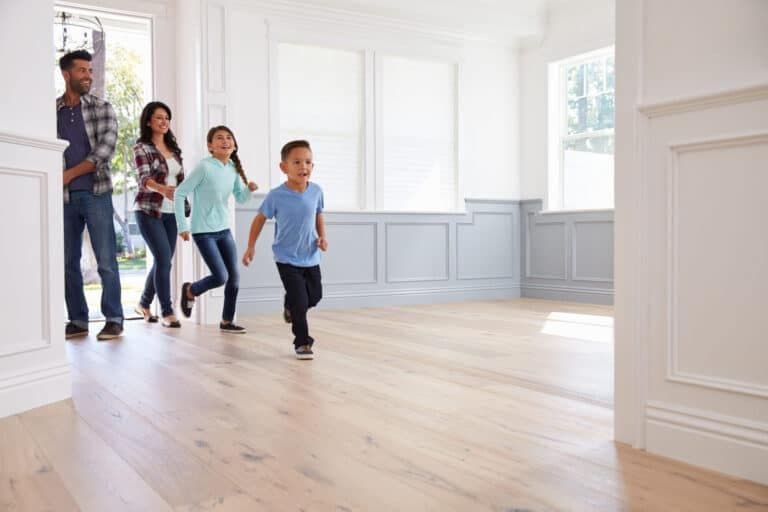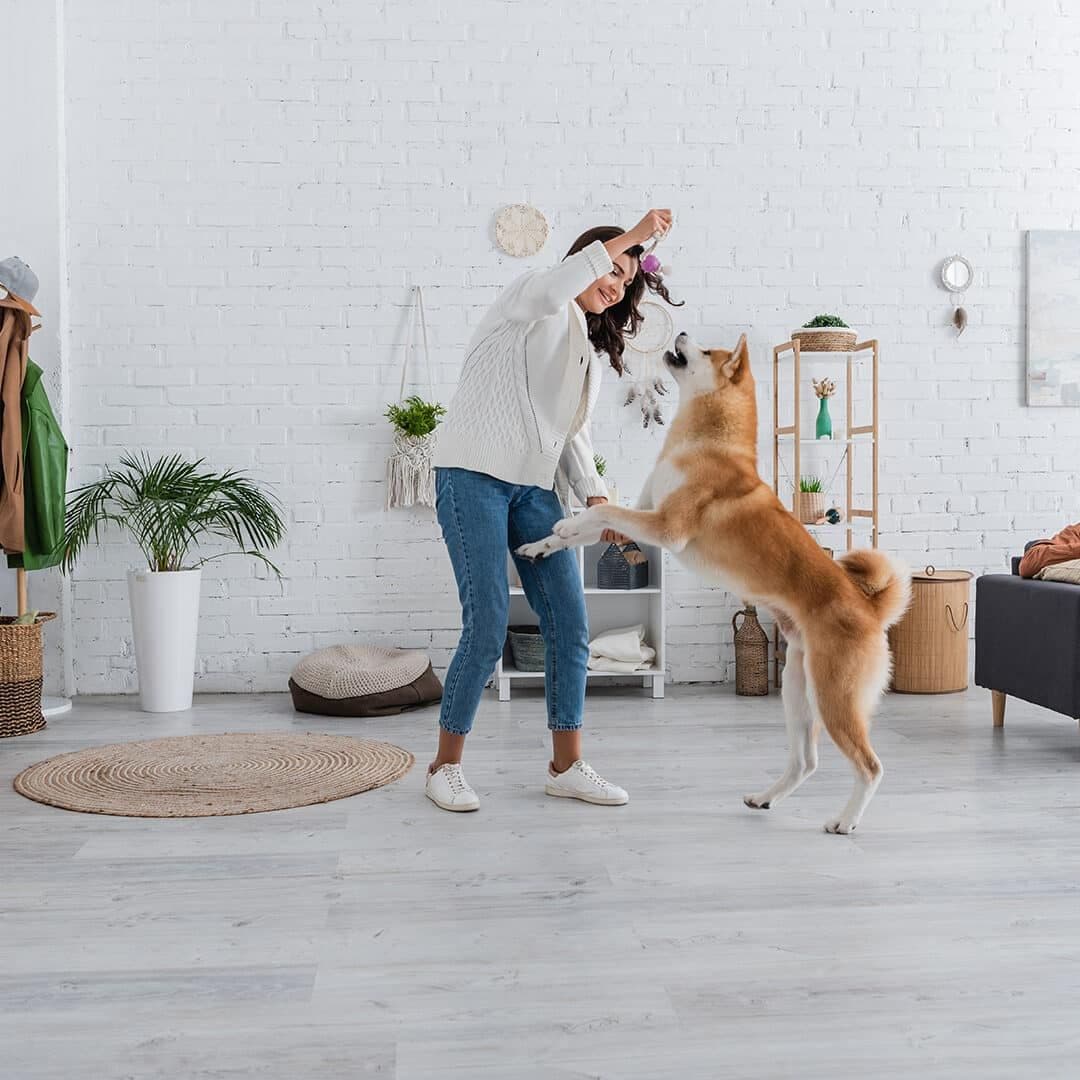The Ultimate Guide to Basement Flooring:
Making the Right Choice
Basements of the past were often under-utilized space. Often left unfinished and used primarily for storage. Today, they are known as entertainment areas, rec rooms, and family rooms, often the center of activity for families. If your basement is unfinished or you’re looking to update it, choosing the right flooring is an important decision and often sets the tone for the room.
In our guide to basement flooring, we’ll look at the different types, including luxury vinyl tile (LVT), engineered hardwood, laminate, carpet, and concrete as your basement floor. We’ll look at the pros and cons of each and the number one factor to think of when choosing flooring for your basement. Let’s begin.
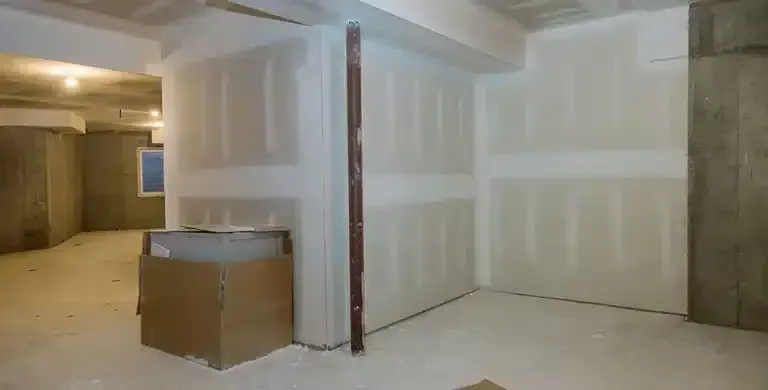
Understanding Basements
Basements have been around for almost as long as housing has. Archeologists have found remnants of basements as far back as the Roman Empire, where these rooms were used for storage or servants’ quarters. Today, many older homes have root cellars or crawlspaces under the home that could be used to shelter during storms, as well as a place to keep food from freezing. Naturally, the early cellars and basements were surrounded by dirt walls and could be places where mold was common, as were damp conditions. In the United States, there are areas where basements don’t make a lot of sense due to the climate and soil conditions, typically in the south.
Unique Factors
Since the basement is underground, moisture is the most important factor to consider. Even in dry areas of the country, such as the southwest, basements can be prone to dampness and moisture, which can damage certain types of flooring. If you live in areas prone to flooding, you should also carefully consider the flooring choice for your basement. It is crucial to choose a flooring option that is resistant to moisture.
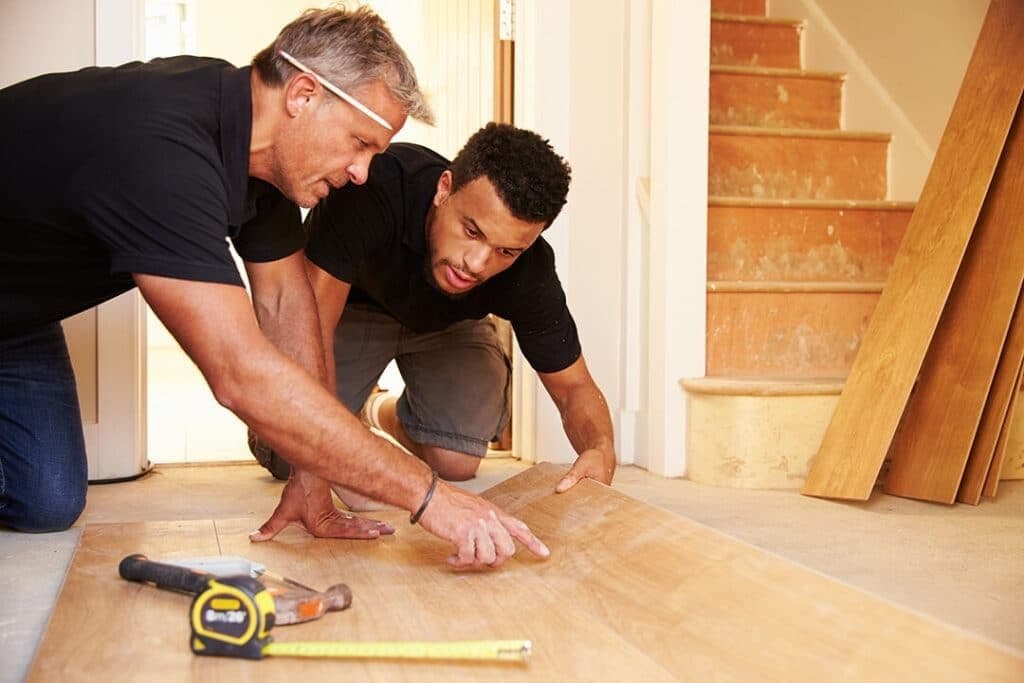
Flooring Options for Basements
The flooring options discussed include Luxury Vinyl Tile (LVT), engineered hardwood, carpet, ceramic or porcelain tile, and concrete.
Luxury Vinyl Tile
Luxury Vinyl Tile, or LVT, is a versatile and waterproof flooring that looks like natural materials like hardwood and stone. It’s made from multiple layers that provide durability and resistance to moisture. Due to its durability, it’s perfect for busy, high-traffic areas.
Pros
- 100% waterproof and moisture-resistant
- Excellent durability and longevity
- Easy to maintain and clean
- Slip-resistant wear layer
- Soft and warm underfoot
- A wide range of stylish designs
Cons
- Requires proper maintenance and care
- It can be difficult to remove once it is installed
With Refloors Lifetime Guarantee, you’ll never need to worry about your flooring again.
Engineered Hardwood
Engineered hardwood flooring is made from layers of real wood veneers and plywood, providing a more stable and moisture-resistant alternative to solid hardwood. Engineered hardwood is considerably less expensive than real hardwood flooring.
Pros
- Offers the warmth and beauty of real wood
- Less expensive than real hardwood
- Can be refinished instead of full replacement
- May add value to home
Cons
- Wood is not ideal for basements
- Not moisture resistant
- Affected by fluctuations in temperature and humidity
- Hardwood is prone to scratching
Laminate Choices
Laminate flooring is made up of many layers of synthetic materials. It is designed to resist wear and tear and can look like stone, wood, or tile. The bottom layer of laminate is backing that helps to stabilize and prevent it from warping or buckling.
Pros
- Relatively inexpensive
- Easy to install
- Easy to clean and maintain
- A great choice for families
- Comes in many color and style choices
Cons
- Not as water-resistant as other options
- It can be noisy underfoot
- Not as aesthetically pleasing as hardwood or tile
Porcelain and Tile in a Basement
A popular option for basements is ceramic or porcelain tile. Tile is resistant to moisture and can withstand damp conditions. It’s easy to clean and maintain, making it a practical choice for basements. Another advantage of ceramic or porcelain tile is that it is durable and can withstand heavy foot traffic and heavy furniture.
Pros
- Resistant to moisture
- Can withstand damp conditions
- Easy to clean
Cons
- Expensive
- Hard underfoot
- Difficult to install
- Grout maintenance can make it difficult to maintain a clean appearance
- Needs to be resealed periodically
Carpet Flooring
Carpet is a common flooring choice for basements. It makes for a cozy and warm space. However, it’s essential to consider the moisture-related drawbacks.
Pros
- Comfortable and warm underfoot
- High noise reduction
- Wide variety of styles and color choices
Cons
- Susceptible to moisture and mold
- Requires moisture-resistant options
- Regular cleaning and maintenance are crucial
- It can be difficult to clean and get out stubborn stains
- It can be expensive based on the type of carpet and how much
Since basements can be prone to flooding, moisture, and mildew, carpet is not ideal. If you want carpet above any other choice making your basement as waterproof as possible before installing carpet is important. This could involve waterproofing walls with some epoxy or other material. It could mean having a professional plug holes and cracks, resealing window wells, waterproofing exterior walls, and other measures such as installing a French drain system.
Keeping the Concrete
Sometimes, homeowners opt to keep the concrete floor as is, exposed or enhance its aesthetics. This is a highly inexpensive choice! If you don’t want the standard concrete color there are options to stain or paint the concrete. Paint is not as durable and long-lasting as a stain. As long as the subfloor is in good condition, keeping your concrete floor in your basement can be a great choice.
Pros
- A minimalist and industrial look
- Opportunities for creative finishes and rugs
- Affordable
- Easy to clean
- Water-resistant
- Highly durable
Cons
- May require sealing for moisture resistance
- Hard and cold underfoot
- Might not be considered attractive
Aesthetics and Design
Basements can be transformed into beautiful and functional spaces. Consider the overall design and aesthetics of your basement when selecting flooring. From man caves, bachelor pads, guest rooms, home theatres, art studios, game rooms, home gyms, bars and lounges, playrooms, home offices, and storage rooms, the sky really is the limit. The right flooring choice will always complement your decor and create a cohesive design scheme.
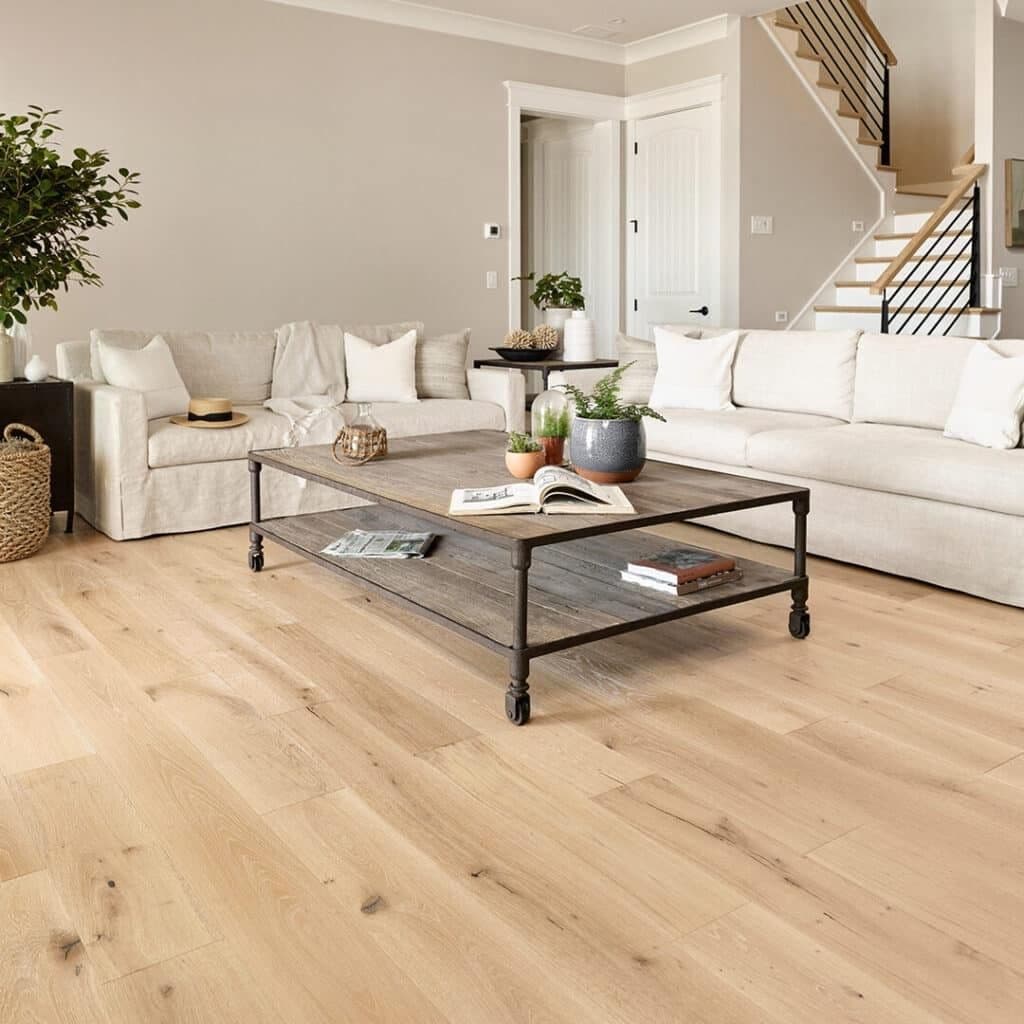
There's More at Refloor!
Remember that a well-chosen basement floor can help transform the dark, cobweb-filled space it may be right now into a lively area that you and your family can enjoy for years to come. Take the time to explore options, assess your basement’s unique challenges, and make an informed choice that suits your lifestyle and budget.
For more information, product recommendations, expert advice, and offers, contact us today. Your dream basement is just a few flooring choices away!
Recent Posts
When it comes to upgrading your home, nothing transforms a space quite like new floors. And now, Refloor, the leader in fast, easy, and guaranteed-for-life flooring is bringing its award-winning process to the Chicago area...
Think All Luxury Vinyl Is the Same? Think Again. Luxury vinyl flooring is super popular in today’s homes—and it’s easy to see why! It looks ...
Which One’s Smarter? Thinking about getting new floors? Want something that looks like real wood but doesn’t need a ton of care? Luxury Vinyl...
Read What Refloor's Customers Are Saying
Product, services, and warranty sell themselves, but Ryan was an excellent interpreter of all information. He was professional, personable and patient with us throughout the process. Will definitely refer to friends and family.
I'm very satisfied with the work done by Josh and his helper . I am very happy with Sam by keeping me up to date on the scheduling before and after the work began. VERY HAPPY CUSTOMER
Super nice and very informative. Took time to explain every detail and answer all the questions we had.




Contact Us
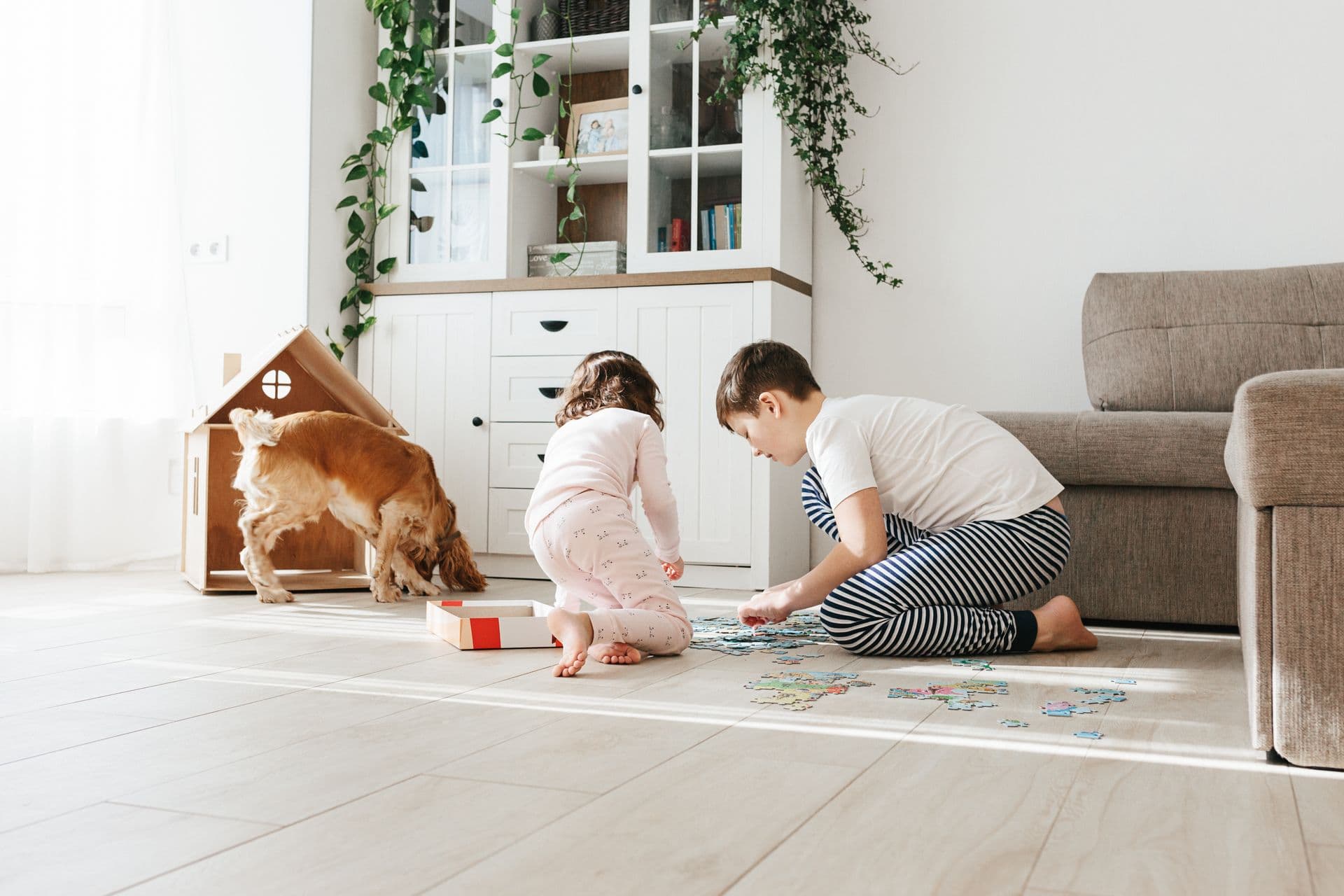
Mon - Thu: 8AM-8PM
Fri - Sat: 8AM-6PM
Sun: 10AM-5PM


